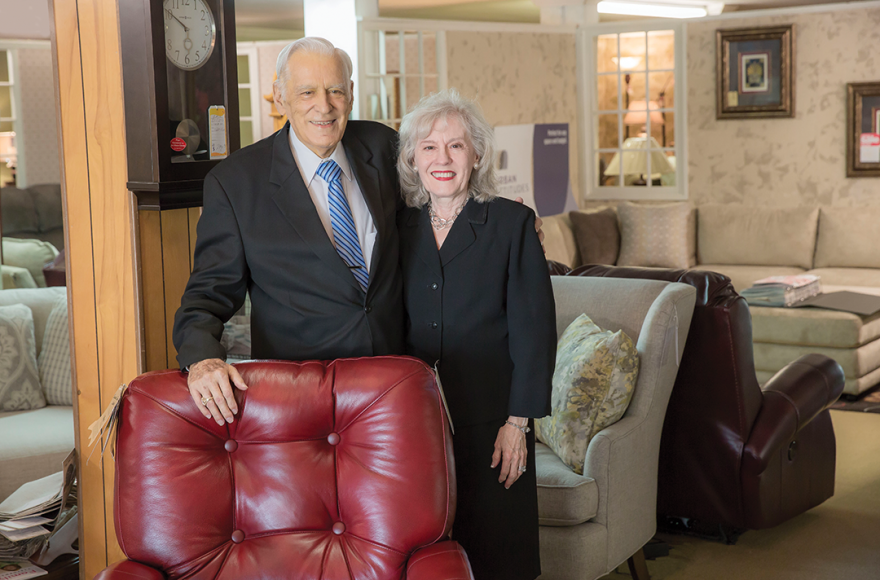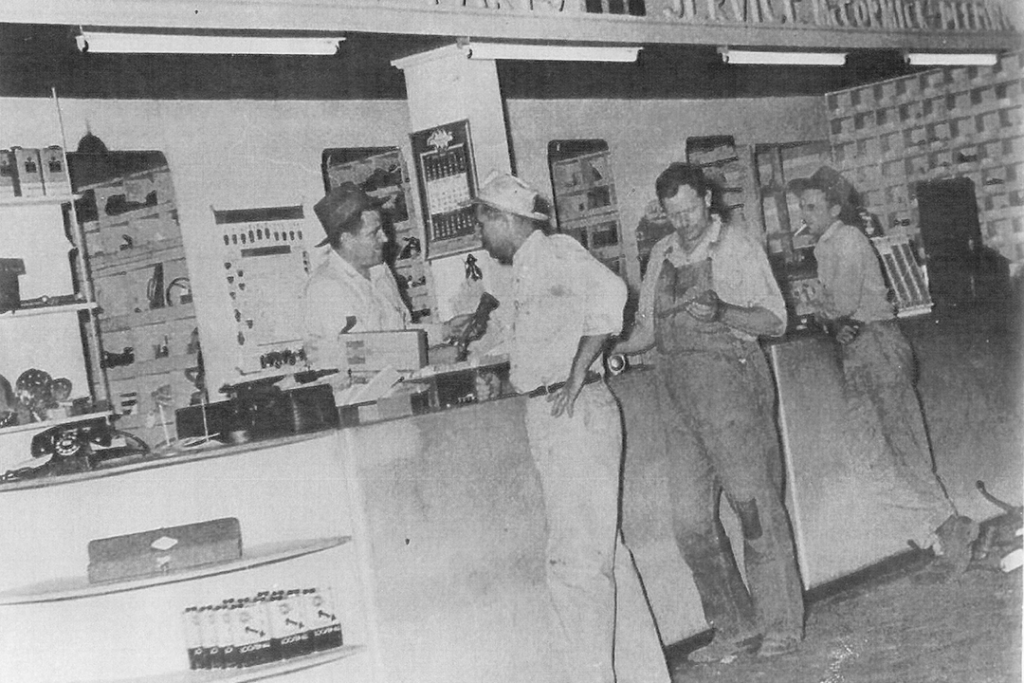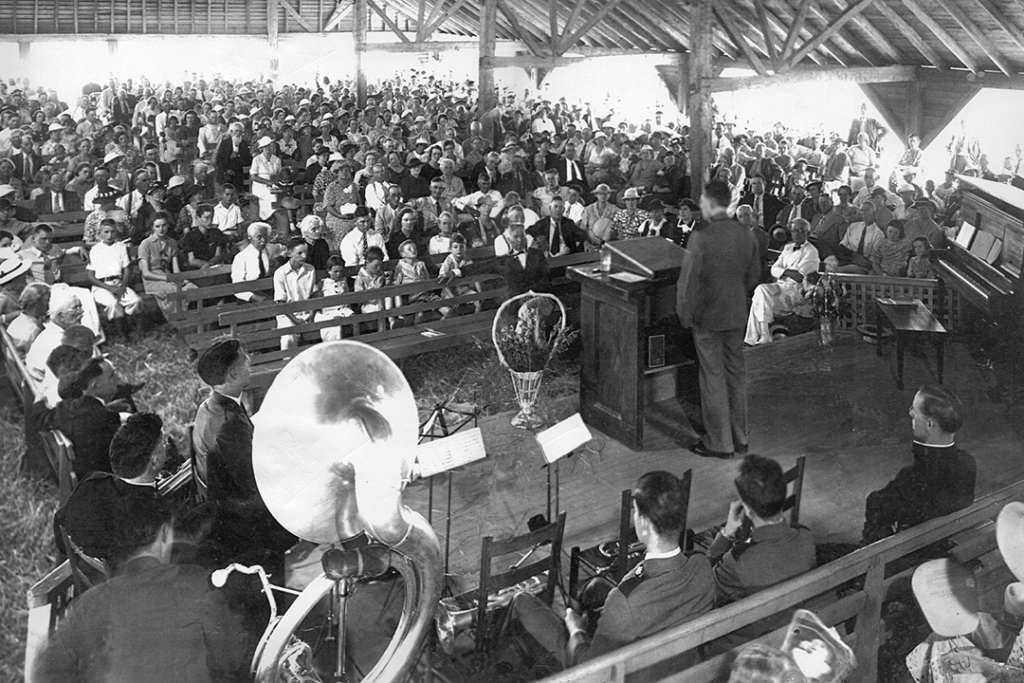Ramsey Furniture Company has seen much in its 100 years of existence, from the Roaring Twenties to The Great Depression. Through it all, it has served as an economic pillar for Newton County.
Saturday in Covington had dawned crystal-clear. The two horses stood patiently in their harnesses, hitched to the trolley which resembled an open-air railway passenger car. When the driver issued an almost inaudible “cluck,” the horses dutifully began a slow shuffle westward on the well-worn, dirt road that was the main thoroughfare between Atlanta and Augusta, known locally as Clark Street. The Covington Trolley was underway, and not a moment too soon, as the rural folk from Newton County regarded Saturday as “go to town” day.
The horses turned right on a secondary dirt road, Emory Street, and pulled with a slight strain up the hill to the railroad depot. There the trolley stopped, as passengers inbound from the Oxford Trolley eagerly took their seats, even as outbound travelers boarded the Oxford-
bound coach.
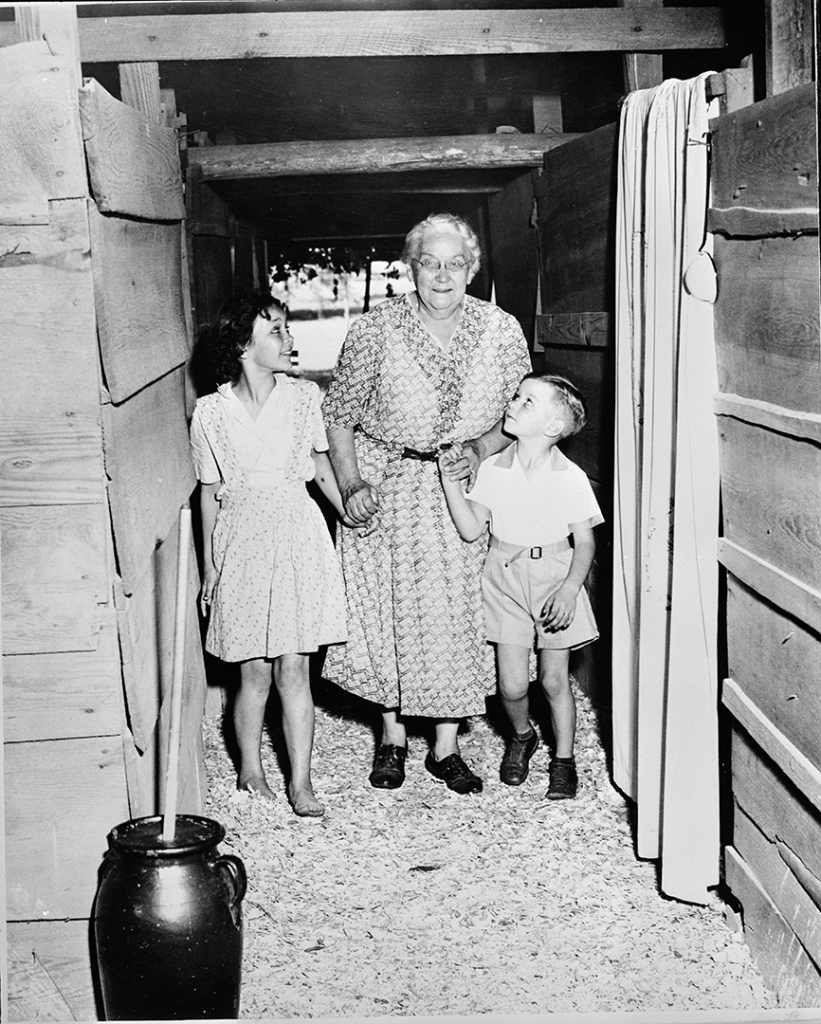
Courtesy of Georgia Archives, Vanishing Georgia Collection, New190–83
Retracing their path toward the Covington town Square as the horses made their way uphill on Clark Street, they were startled—briefly—by one of those still new-fangled “horseless carriages.” The Ford Model T, chugging along on its 22-horsepower, four-cylinder engine, backfired, causing the trolley horses a few moments of anxiety. The Model T might have been bought at a local dealership, located in what was now an almost-empty building immediately adjacent to the big, columned Bank of Covington. However, the dealership was long gone on this fine Saturday morning, leaving only a brand-new enterprise just starting up in the back of that same building between Clark and Odum streets.
As the dust cloud from the Model T cleared away, the name of the new business became visible: Ramsey Furniture Company. It was 1919. The new 20th century had barely just begun.
“Our secret has always been to be honest with our customers and to ask them to actually shop and know what they’re looking at. We have never sold anything but first-rate, brand-name furniture, and we ask our customers to actually compare with other stores which offer cut-rate pricing and claim to have the same quality furniture.”
Sam Ramsey, Ramsey Furniture Company Owner
Newton County, in those days, was still a prosperous, agricultural-based place, and no spot in the county exemplified that prosperity more than the town Square of the county seat: Covington. The Square featured a newly completed, Empire-style courthouse, the grand edifice of the Bank of Covington and no fewer than nine watering holes where folks arriving on horseback, or in horse-drawn buckboards, could tie up and slake their thirst.
The more things change, the more they stay the same, or so goes the old tried-and-true proverb. It is now 2019, 100 amazing years later than when those horses pulled that trolley on the unpaved Clark Street. The Covington Square still boasts that beautiful courthouse, the big bank building and no fewer than nine establishments—counting the nearby side streets—where folks can fill their bellies or quench their thirsts.
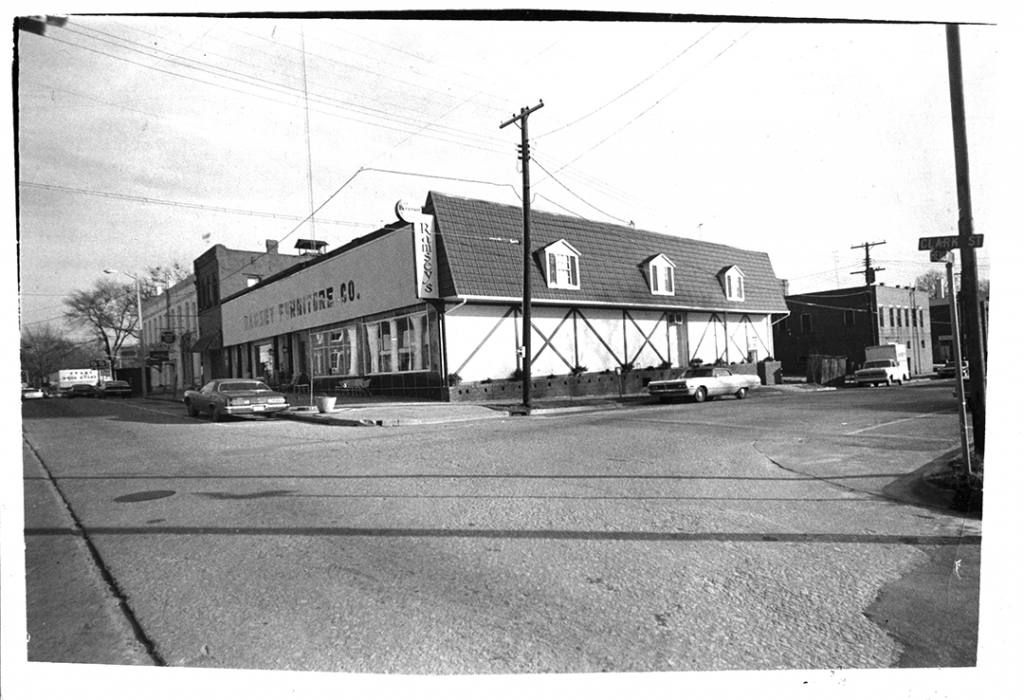
Through all the changes, through all the epic moments unfolding in American history over the course of that 100 years, the Ramsey Furniture Company, from its humble beginnings in the back of a deserted automobile dealership, has flourished. How, one might ask, could any small-town enterprise survive over the course of 100 remarkable years? One of the tenets of free-enterprise economics is the “boom-and-bust cycle.” For Ramsey Furniture to not only have survived but thrive has to be considered a stunning achievement.
“Well,” said current owner and former Covington Mayor Sam Ramsey, “it certainly has not been easy. Most every student of history knows about the Roaring Twenties and The Great Depression of the 30s, but only locals and anyone in agriculture can remember the depression not many talk about, which was in the early 1920s, when the boll weevil struck the Deep South.”
Indeed, Sam’s grandfather, C.D. Ramsey, was primarily into farming cotton; the furniture store idea was secondary. After three years, he moved across Clark Street to the building where the business is presently located, just in time to hand off the running of the store to Sam’s father, C.D. Ramsey Jr., who had to deal with the boll weevil disaster.
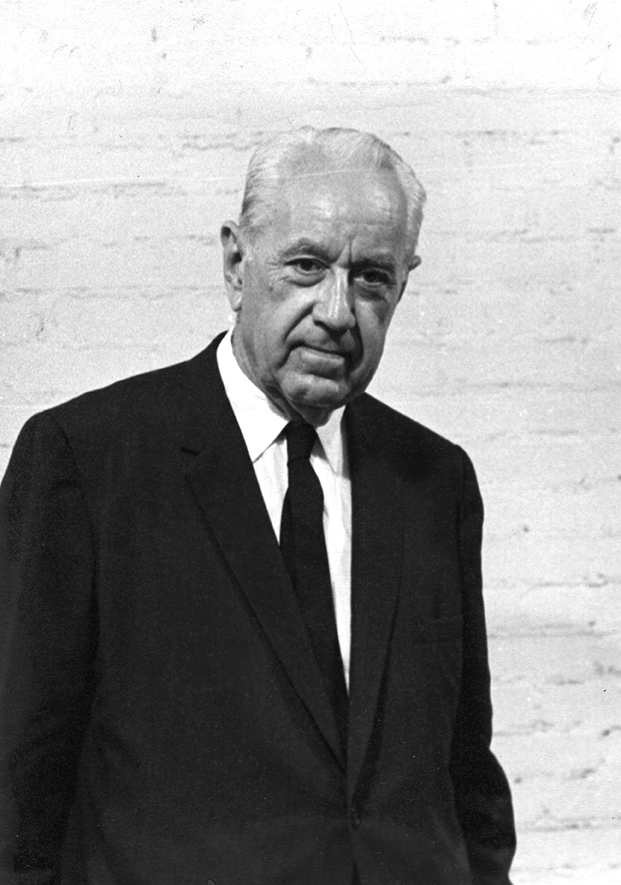
Most students of American history recall tales of “The Dust Bowl” from the early 1930s. The breadbasket of the nation, the Great Plains and Midwest, was devastated as millions of metric tons of topsoil were literally blown away by howling windstorms. Farmers had not yet learned about contour plowing, crop rotation and planting windbreaks perpendicular to the direction of prevailing weather patterns to protect the crops.
It is likely, though, that Americans other than Southerners are unfamiliar with the devastation wrought by that one-quarter-inch-long beetle with the very pronounced snout: Anthonomus grandis Boheman. Commonly called the boll weevil, hordes entered the United States near Brownsville, Texas, in 1892 and advanced up to 160 miles per year, sweeping across the South and up the Atlantic Seaboard until the entire cotton crop territories of the Deep South were infested in 1922.
For many entrepreneurs in small Southern towns, the onslaught was more than devastating. Whole communities dried up, as businesses dependent upon agricultural dollars folded. Citizens moved to the bigger towns and large cities hoping to find work of any kind. Today in Newton County, kudzu vines cover swaths of the fields that once produced cotton, and under some of those same vines can be found ruins of small, once-thriving establishments.
It was into such an upside-down economic situation that C.D. Ramsey Jr. found himself trying to make a go of it in the furniture business in the early 1920s.
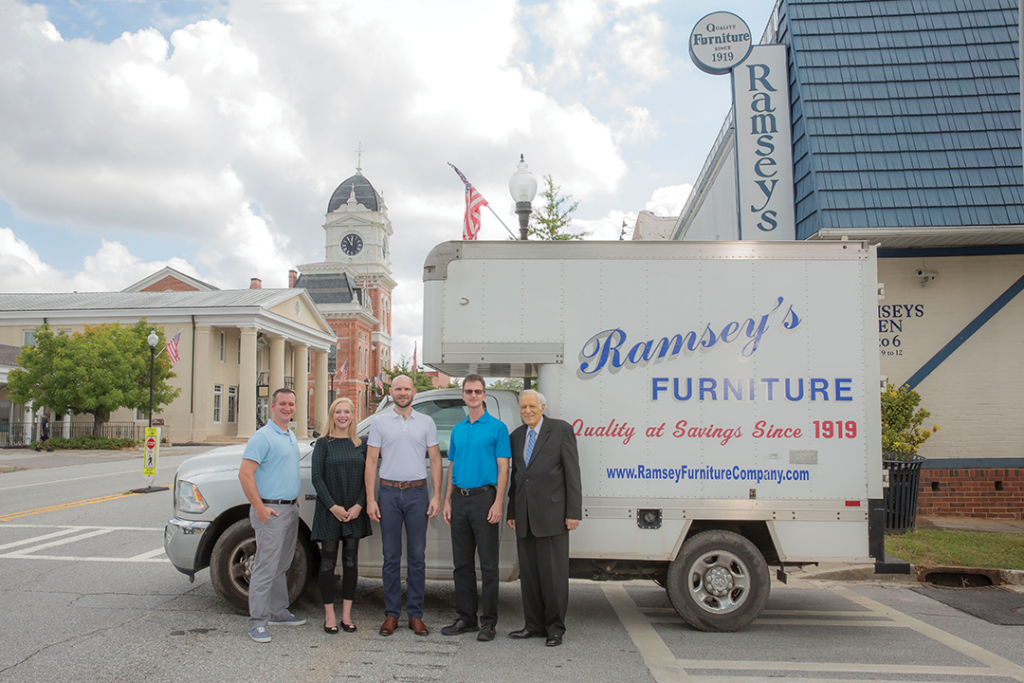
“Can you imagine buying iron bed stands for $10 apiece from the manufacturer and having to sell them over the next few years for $2 apiece just to keep the doors open?” asked Sam Ramsey.
Yet C.D. Ramsey Jr. (pictured below) managed to keep those doors open. In the aftermath of “The Great War,” as World War I was called in those days, prosperity was on the upswing in big cities across America. The “doughboys,” having persevered in the trenches against horrific chemical weapons so heinous that the entire world agreed to ban their use, were welcomed home in grand style. However, it was a very different America in 1919 and on into the early 1920s. Big cities were still located in the Northeast, upper Midwest and far West. Atlanta, for example, had a population of just over 200,000 in 1922, the year WSB radio began broadcasting on what became “the 50,000-watt, clear-channel voice of the South.” Now, 4.4 million call the Metro area home.
Even as C.D. Ramsey Jr. was managing to get a grip on his situation and as the prosperity of the Roaring Twenties finally reached smaller towns, along came the national economic disaster of the 1930s, leading up to the costliest war in human history: World War II. As Americans rallied behind the war effort, sacrifices of materiel which could be used for weaponry and other military necessities made it exceptionally difficult for small-business owners to survive.
Sam Ramsey was not old enough to join the military for that war but served in the United States Air Force during the McCarthy Era in the 1950s. After his hitch, Sam returned to Covington, where he took over running the furniture business from his father in 1964.
From 1964 until the present day, Sam has been at the helm. He has not only maintained the business but expanded it many times over from that humble beginning. The original store is long gone now. A parking lot directly across Clark Street from the current storefront adjacent the BB&T bank offers no testimony as to what once was there; and when Ginn Chevrolet built a new campus out by Interstate 20, Sam expanded his vast showroom and warehouse storage into the building Ginn formerly occupied, immediately across Clark Street from First Presbyterian Church.
With the coming celebration of 100 years in business, Sam’s nephew, Tony Ramsey, has come on board and is gradually taking the reins of guiding the fortunes of the Ramsey Furniture Company. Are there big changes ahead? Are there any secrets as to how Sam and his predecessors have managed to survive in a business climate fraught with economic peril? In an era when brick-and-mortar stores are in decline due to the advent of Internet shopping, is a sea change in the offing?
“No, not really,” Sam said. “Our secret has always been to be honest with our customers and to ask them to actually shop and know what they’re looking at. We have never sold anything but first-rate, brand-name furniture, and we ask our customers to actually compare with other stores which offer cut-rate pricing and claim to have the same quality furniture.”
Indeed, the bait-and-switch tactic has been around as long as marketing and advertising in virtually every field of endeavor. The television and print media feature a multiplicity of advertisements offering quality products at low, low prices. Yet when consumers actually come face-to-face with the product, in many cases, they find that it is not exactly what was advertised. There is an old but tried-and-true axiom about free enterprise, for example, which applies here: “If it’s cheap and fast, it won’t be good; if it’s good and cheap, it won’t be fast; and if it’s fast and good, it won’t be cheap.”
Every customer wants a product of which they can be proud, a product which will last them for as long as they wish to use it. Ramsey Furniture’s approach has always been to offer top quality, knowing that any satisfaction gained from a low price will pale significantly if the product does not hold up over time.
“If our customers will let us help educate them what to look for,” Sam said, “we’ve found that they end up appreciating that the quality they get here is worth the price they pay, and that is how we provide ‘quality at savings since 1919.’”
The horses drawing the trolley have long since been put out to pasture. The dirt road that was Clark Street became paved and turned into part of U.S. Hwy. 278, linking Atlanta and Augusta. When the “new four-lane bypass”—as the rerouted 278 was known—took the heavy traffic off the Square back in the early 1960s and when I-20 took even more away in the 1970s, folks wondered if the little town of Covington would survive or simply dry up. Like the Phoenix rising from the ashes, little Covington has reinvented itself. The horseless carriages bring folks from far and wide to visit, to eat and be entertained, and to shop. Highlighting the incredible voyage, which began 100 years ago and counting, Ramsey Furniture Company is still here, helping anchor the business community and offering “Quality at Savings since 1919.”
Click here to read more stories by Nat Harwell.

